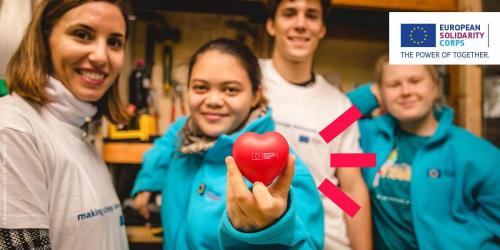
https://ec.europa.eu/commission/presscorner/detail/en/ip_22_284
Recognising the key contribution of volunteering for the development of young people's skills and competences and its role in positively overcoming societal challenges, the proposed Recommendation aims to boost the inclusiveness, quality, recognition and sustainability dimensions of transnational youth volunteering. Addressing the remaining impairments to volunteering mobility, the proposal tackles lessons learned during the COVID-19 pandemic and in the implementation of the European Solidarity Corps, which will celebrate its 5th anniversary in 2022. Vice-President for Promoting our European Way of Life, Margaritis Schinas said: “Since 2017, tens of thousands of young Europeans have made a difference by taking part in volunteering and solidarity projects of the European Solidarity Corps. With today's recommendation, we are supporting and facilitating further volunteering for young people, so that many more of them can spread solidarity and hope throughout Europe and beyond." Commissioner for Innovation, Research, Culture, Education and Youth, Mariya Gabriel said: "Volunteering is increasingly popular among young people willing to engage in building a better, and more inclusive Europe. This new initiative aims at improving the quality of their volunteering and remove remaining obstacles to cross-border mobility. It will contribute to reinforcing solidarity opportunities for young people during the European Year of Youth 2022.” The Commission's proposal on youth volunteering invites Member States, among others, to: The Commission stands ready to support the implementation of the Recommendation through the cooperation mechanisms and tools of the EU Youth Strategy and the EU youth programmes, such as Erasmus+ and the European Solidarity Corps. The Commission will facilitate mutual learning and exchanges among Member States and relevant partners, by developing best practices in digital and inter-generational volunteering and by promoting and informing about volunteering opportunities through the European Youth Portal. It will also further develop and promote the existing EU validation tools for learning outcomes of non-formal and informal learning (Europass, Youthpass) and support research and data collection on the long-term impact of volunteering. The Commission calls on Member States to swiftly adopt today's proposal on international youth volunteering and solidarity actions. It commits to report on the use of the Recommendation in the context of the work on the implementation of the EU Youth Strategy and of the strategic framework for European cooperation in education and training towards the European Education Area and beyond. The Commission's proposal builds upon several prior works on the topics, including a study, an expert group report, and an evaluation. The proposal was preceded by a public consultation and a Commission roadmap. It will replace the 2008 Council recommendation on mobility of young volunteers to take into accounts all developments since 2008. Volunteering is an important activity for Europe's youth: 34% of youth stated in 2019 that they had engaged in organised volunteering activities within the past 12 months. This figure has been continuously increasing, from 24% in 2011. Young EU citizens can take part in transnational volunteering through the European Solidarity Corps programme, or as part of national or regional schemes supporting cross-border volunteering activities (in place in Italy, Greece, Sweden, Austria, Slovenia, France, Slovak Republic, Belgium, Bulgaria, Czech Republic, Finland, Germany, Ireland, Luxembourg, Poland, Malta and Spain). The total budget of the European Solidarity Corps programme for 2021-2027 is €1 billion with over €138 million available in 2022. Commission proposal for a Council Recommendation on youth volunteering
Next Steps
Background
For More Information
Print friendly pdf
- 5682 reads










Add new comment